|
|
|
Sort Order |
|
|
|
Items / Page
|
|
|
|
|
|
|
| Srl | Item |
| 1 |
ID:
107286
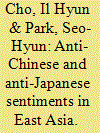

|
|
|
|
|
| Publication |
2011.
|
| Summary/Abstract |
Spanning the presidencies of George W. Bush and Barack Obama, anti-Americanism has become somewhat of a growth industry. Its products are avidly consumed not only in the United States but around the world, often for quite different political purposes. It is not surprising that anti-Americanism plays a large role among traditional enemies of the United States in the Middle East.1 But the same is true of America's allies just across the border, such as Canada and Mexico, and living far apart, such as Australia and New Zealand.2
It would be a big mistake, however, to think that these oppositional sentiments-the complex mixture of opinion, distrust and prejudice-are directed only against America. It plays a role in all parts of the world. Secondary or subordinate states in each world region resent the regional top dog. Such resentment can take various political forms. In Europe, latent anti-German feelings linger, sometimes very close to the surface. When Germany takes a stance against its partners in the European Union, as it has at various times in the unfolding financial crisis, historical anti-German sentiments are quick to appear. Small states in Latin America and Africa also harbour resentment against the self-proclaimed leadership roles of Brazil and Nigeria. And in the Middle East, cross currents of nationalism and religion generate different kinds of political resentment.
East Asia is no exception to this generalization. A large literature focuses on the role of history in shaping the region's current political fault lines. Even minor political crises of the day reveal lingering, deep resentments. In sharp contrast to Europe, however, painful historical memories continue to shape directly, even to provoke, current political crises. This is one important reason why, in a world of regions, East Asia differs from Europe.3 The heavy hand of history, however, has …
|
|
|
|
|
|
|
|
|
|
|
|
|
|
|
|
| 2 |
ID:
111924
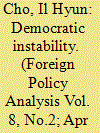

|
|
|
|
|
| Publication |
2012.
|
| Summary/Abstract |
During his tenure, President George W. Bush touted the East Asian democratic experience as a positive model for democratization in the Middle East. Contrary to the premise of democracy leading to regional stability, however, East Asian democracies in the past decade have often become a source of regional instability. Based on a comparative analysis of political developments in Taiwan, Japan, and South Korea, this paper explores the foreign policy behavior of East Asian democracies and assesses the overall impact on regional security dynamics. Specifically, I argue that incomplete democratic consolidation, combined with the political salience of national identity, sparked a process of acute intergroup competition among domestic political actors. As a result, the foreign policy orientation of the three East Asian democracies became belligerent, thereby unnecessarily increasing regional tensions.
|
|
|
|
|
|
|
|
|
|
|
|
|
|
|
|
| 3 |
ID:
161505
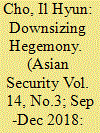

|
|
|
|
|
| Summary/Abstract |
By investigating the domestic debate over the US troop reduction in Japan and South Korea for the past several decades, this article explores variation in the Asian allies’ reactions to American retrenchment. Instead of inferring regional responses solely from external security environments, this paper pays particular attention to domestic political contexts in which different political actors compete to frame the meanings and consequences of the US military presence, with implications for alliance dynamics in East Asia. I argue that along with the perceived levels of external threats, considerations of foreign policy autonomy and political legitimacy shape the ways in which the two Asian allies have responded to the US retrenchment.
|
|
|
|
|
|
|
|
|
|
|
|
|
|
|
|
| 4 |
ID:
186009
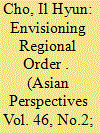

|
|
|
|
|
| Summary/Abstract |
With its nuclear provocations and missile launches, North Korea has been viewed as a major impediment to building a cooperative security order in East Asia. What is puzzling, however, is that it is North Korea that has sparked a range of regional initiatives from South Korean governments. What is the role of North Korea in South Korea's search for a new regional order in East Asia? Does the nature of inter-Korean relations affect the types of regionalism sought by South Korean governments? To address these questions, I examine the scope and priorities of the regional initiatives led by the four South Korean presidents in the past two decades. I argue that the nature of inter-Korean relations and the foreign policy orientation of South Korean leaders in power explain the different types of regionalism pursued by South Korean governments.
|
|
|
|
|
|
|
|
|
|
|
|
|
|
|
|
| 5 |
ID:
174670
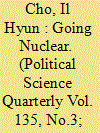

|
|
|
|
|
| Summary/Abstract |
IL HYUN CHO discusses China’s pursuit of nuclear energy and identifies domestic political legitimacy and geopolitical ambitions as key factors shaping Beijing’s policy. He argues that China’s nuclear drive raises questions about nuclear safety and proliferation.
|
|
|
|
|
|
|
|
|
|
|
|
|
|
|
|
|
|
|
|
|